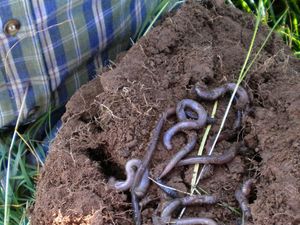
Vermicast
The most obvious reasons for Vermicast are:
Compost Activator

A particularly good soil conditioner can be made from compost mixed with 5 - 10% vermicast. Compost is not a fertiliser but is organic matter, which helps to bind the soil and increase its structure and moisture holding capacity. It is an injection of biota for the soil, and the presence of vermicast also adds plant growth stimulants. Vermicast is not a fertiliser either, although it appears to act that way. A mixture of compost and vermicast is full of soil benevolent bacteria that use the OM of the compost for energy to produce aggregate-forming polysaccharides. It will encourage worms to self populate and, soon, your garden soil will be able to hold many times more water than previously - some claim more than six times.
Germinator
In pure form, castings provide a superior rate of germination. The seedlings produced from 100% vermicast will be unusually healthy.
(After germination, the seedlings should be transferred to potting mix.)
Potting Mix
An excellent potting mix formula is 5 - 10% vermicast, mixed with any other potting medium that does not have a nitrogen demand. It will provide sufficient nutrition to sustain vigorous, healthy growth for up to six months.
Soil Conditioner
Even in quite barren soil, a good sprinkling of castings (around 2-3mm thick) dug in and watered well will awaken quite amazing results for the first season's plants. It's never too late or the wrong season to apply castings and each successive year will see more improvement, especially if more castings are applied.
Tree Planting
Sometimes, the failure rate of tree planting can have a dampening effect on our hip pocket. A hand-spade of castings in the bottom of the hole dug for the tree will help ensure healthy growth right from the start.
Seed Inoculation
The difference between successful seed planting (of a lawn, for example) and outstanding seed germination is the bacteria and hormones from castings. Take the seed and shake it together with vermicast (10% vermicast is plenty) before you spread it.
Fertiliser Replacement
Sprinkle vermicast around the base of plants (spread it broadcast by hand or use a seed spreader) and dig it in. Do this at the end of the day - preferably in the twilight, as this reduces the damage that can be done by direct sunlight - and always water well.



